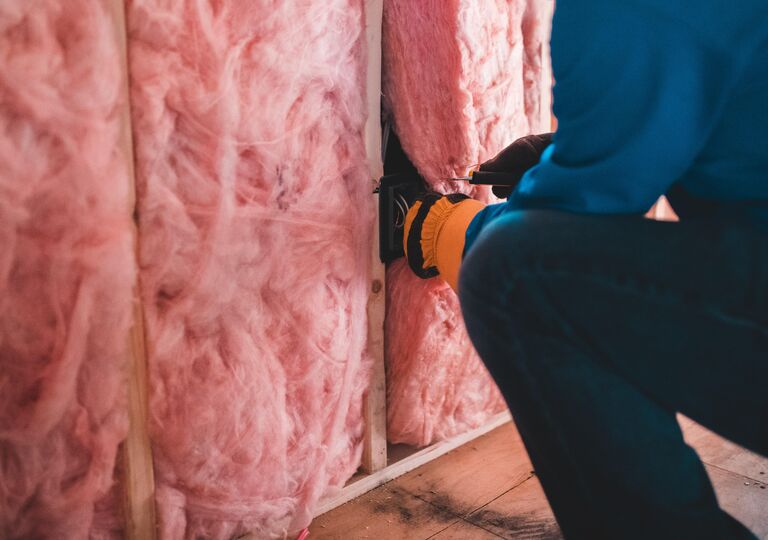
Keep Warm This Winter
Every year, Metro Mayor Dan Norris runs a Keep Warm This Winter campaign. This provides advice to people on how to save on their energy bills and look after their elderly or vulnerable family and friends. It also points people to the charities and other organisations that can offer advice and support.
 Image credit: Claudio Schwarz
Image credit: Claudio Schwarz Tips on staying warm
It’s important to stay above 17°C, especially if you’re ill, an older person, or have young children. Visiting public buildings, friends and family can help you keep warm.
Councils are making designated heated public places you can spend time in for free and keep warm. Many churches, community centres, libraries and museums also offer free entry. Visiting friends and family can help avoid needing to keep all homes warm simultaneously. You can find details of public buildings to help keep warm in:
- South Gloucestershire’s Community Welcome Spaces
- Bristol’s Welcoming Spaces
- Nationally via Find a Warm Welcome Space Today
- Bath and North East Somerset’s Warm Spaces Directory
Tips on saving money off your fuel bill for free
Keeping the area in front of radiators clear of furniture helps heat circulate. When closing your curtains, tuck them behind the radiators to help keep heat in your room.
It’s obvious but turning off lights and appliances on stand-by is one of the easiest ways to save energy. Using your heating and appliances efficiently also helps save money for free:
- A full washing load at a lower temperature and making use of the ‘eco mode’ both saves energy and cash. Most detergents can still clean your clothes at 30°C
- Turn-down radiators and close doors if there's a room you don't use much. Avoid turning radiators off completely to help prevent damp.
- If you can still stay warm, turning down your thermostat by 1 degree could save up to 10% on your heating bills.
- Use your central heating time and your night storage heaters effectively to only heat your home when needed
- Help your fridge run efficiently by keeping temperature between 3-5°C, and allowing air to flow behind it and keeping the coils free from dust and debris. Try to avoid putting hot or warm food in, and defrost frozen food in the fridge to help keep it cool for free
- And your freezer by defrosting it regularly and keeping it as full as you can. Frozen items help keep each other cold, so your freezer doesn’t work as hard!
- Only boil the water you need in your kettle. You can also use them to boil water for cooking, as this is cheaper than using electric hobs
- Keep lids on pans to save energy and steam, and match the pan to the hob size
- Microwaves and slow cookers are much cheaper to run than electric ovens
- If you have one, keep your electric immersion heater set at or just above 60°C. Your hot water tank needs to be at this temperature to prevent harmful bacteria
- Heating via electricity is expensive – don’t leave electric showers, cookers or other electric heating appliances on longer than needed and certainly not unattended. Tumble driers are energy hungry appliances, so dry clothes outside when you can to save £100 a year
- If you have a combi boiler, try setting your central heating output to 70% to save on your heating bills
- Similarly, if your radiators have ‘TRVs’ (thermostatic radiator valves), set these to ‘3’ in rooms you’re wanting to keep warm (rather than the maximum 5).
Are you struggling with the cost of energy?
There are national schemes and local support that could help.
The Winter Fuel Payment is usually paid automatically if you’re eligible. You may get a Cold Weather Payment if you’re getting certain benefits between November 2023 and March 2024.
If cash is short, visit Step Change for help with budgeting or call 0800 138 1111.
Local energy advice organisations work with and can help direct you to other charities. Click on your local council for further help in your area during the cost of living crises: Bath & North East Somerset, Bristol and South Gloucestershire.
Please contact your supplier, using the details on your fuel bill if you might go into arrears. They may be able to help. Please read this advice if you’re worried you cannot pay your bill.
Understanding your energy use
Knowing how much energy you’re consuming and wasting can help you only pay for what you need.
You should regularly read your meters and give your energy supplier meter readings. If you’re unsure of who your energy supplier, you can find your gas and electricity suppliers online.
If you’ve got a Smart Meter, you may not have to do this. They’re also a great way for you to understand your energy consumption, and are provided at no cost to you.
The Energy Price Cap limits the unit rates of electricity and gas, not your total bill. Some households may end up paying more than the average gas and electricity costs and some may pay less. By saving energy where you can, you will lower your bills. This cap on average bills is expected to be £2,000 for the whole of 2024.
You may be able to borrow an energy monitor or even a thermal imaging camera from your local library or community energy group.
You can also buy remote-control standby plugs or even more traditional ‘timer’ plugs to help remotely control when plugged-in devices are on.
Your house may have an ‘Energy Performance Certificate’ (EPC). If so, you can find it here using your postcode.

Insulating your home
About a quarter of heat in your home is typically lost through the roof. Surprisingly, a whole 27cm thickness is the recommendation for insulation.
You might be able to consider wall and floor insulation, heating upgrades or even solar panels.
Local energy advice organisations can help identify local schemes and support you in insulating your home. For information on local grants and help with next steps from:
- Bath and North East Somerset Council visit Energy at home or call 0800 038 5680
- Bristol Council visit Energy Service Bristol or call 0117 352 1180
- South Gloucestershire Council visit Home Energy Advice
Cheap ways to save money on your fuel bills
If your radiators are on external walls, installing reflective foil panels behind them can bounce heat back into the room rather than being lost through the wall. Doing this could save £40.
Insulating floors and installing double-glazing is expensive. However, carpets (or rugs) and thick curtains over doors and windows help keep the heat in. You can also install secondary glazing as, if you don’t have double-glazing, this could save you £150/year.
15% of the money you spend on heating your home could be lost to draughts. Draught proofing makes your home cosier, could save you £100 a year and can be an easy DIY project. You can apply draught proofing strips to your window frames and around doors; draught proof your letterbox and keyhole; and use insulating foam to draught-proof gaps around pipes exiting exterior walls. If your home has one, ensure your loft-hatch isn’t letting heat escape and block chimneys no longer in use.
Severn Wye Energy Agency and CSE have detailed guides on their websites.
If you have a hot water tank, fit an insulating hot water tank jacket to reduce heat loss by 75%. Combine this with insulating your hot water pipes could save you £300/year.